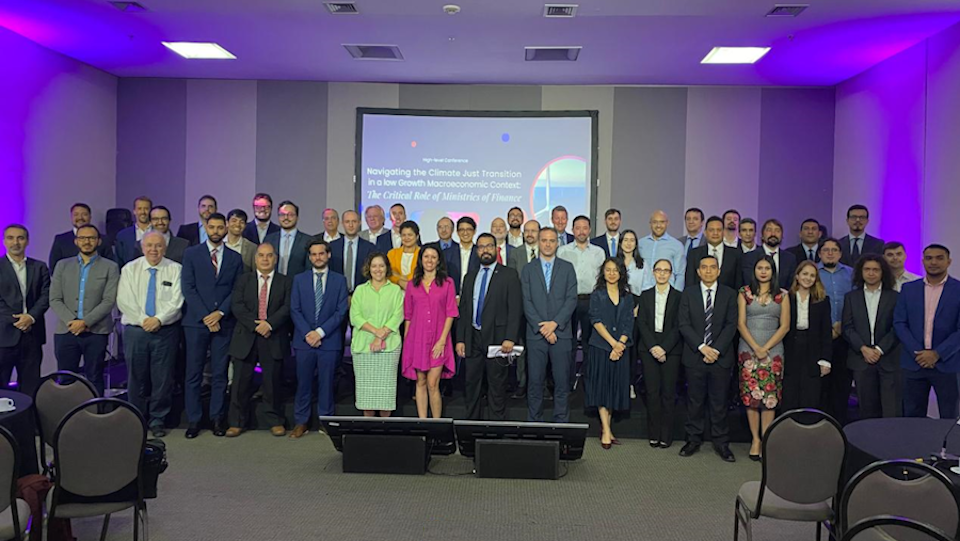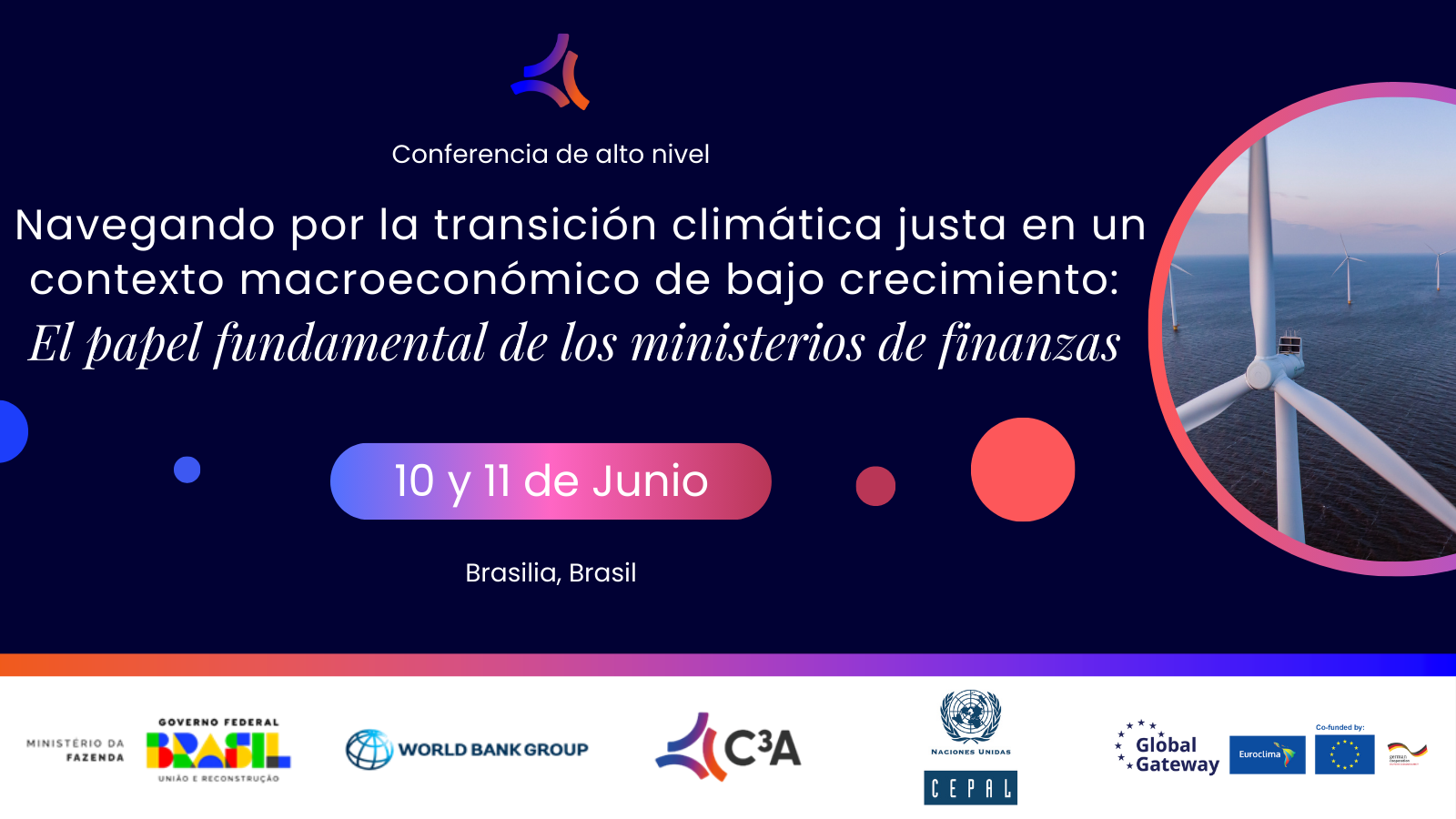Ministries of Finance address their key role in the design and implementation of policies and tools for climate action in the Latin American and Caribbean region
Work area(s)
Representatives of Ministries of Finance, Central Banks, and national and international experts met on June 10-11 in Brasilia to discuss strategies, actions, tools, and challenges in the context of economic growth and limited fiscal space together with high climate vulnerability to move towards a productive, sustainable, and equitable economy.

The high-level conference co-hosted by C3A, the World Bank, with the Ministry of Finance of Brazil and the Economic Commission for Latin America and the Caribbean (ECLAC), with the support of the Euroclima program, brought together a network of experts, scientists, regional economic leaders, and practitioners. They aimed to address the challenges of navigating the transition to sustainable practices within a difficult global and regional macroeconomic context. Key topics discussed included integrating climate considerations into economic, financial, and fiscal planning, mobilizing financial resources for sustainable projects, and coordinating efforts between different actors, including the private sector, to effectively respond to socio-environmental challenges.
“There is an urgent need to develop coordinated and strategic responses to the region's limited fiscal space and significant structural and institutional challenges,” declared Santiago Lorenzo, Head of Climate Change Unit, ECLAC.
The event highlighted the high incidence of extreme weather events affecting the region due to its biological diversity and geographic location, necessitating rapid and effective responses to minimize negative impacts on local communities and economies. Participants examined how structural challenges, such as limited institutional response capacity and dependence on highly polluting sectors, complicate climate change management. The discussions emphasized strengthening public institutions, improving technical capacities, and allocating financial resources for the implementation, monitoring, and evaluation of climate policies. The importance of international cooperation to jointly address these challenges was also underscored.
One critical issue discussed was the difficulty of accessing global climate finance, worsened by asymmetries in access to financial instruments and budgetary constraints. Participants stressed the need for new regulatory frameworks and innovative financial architectures to integrate international public and private funds. The relevance of aligning climate change agendas with local government actions and financial mechanisms to ensure effective policy implementation was also emphasized.
Many Latin countries have implemented policies to address climate change and the green, sustainable and just transition, such as issuing green e/ or sustainable bonds, diversifying the energy matrix, and creating climate funds to mobilize resources for sustainable projects. Discussions on new financial instruments for climate and nature marked another significant phase of the event, emphasizing the alignment of environmental and financial objectives for long-term sustainability.
Participants recognized a widespread lack of knowledge about the macroeconomic scope of climate change and its implications, highlighting the need to improve the supply of specialized research and studies in the region. Presentations on climate scenarios and modeling tools showed that while transitioning to a low-carbon economy can be costly, the long-term costs of inaction would be even higher.
“To make informed decisions that bring together socioeconomic outcomes with climate objectives, Ministries of Finance require advanced analytical tools. It's time to innovate our approach to climate policy analysis,” said Etienne Espagne, Co-Director of the C3A Program.
A significant conclusion of the conference was the need to match the time frames of academia with those of decision-makers while building capacity and knowledge within ministries to create effective public policies balancing both mitigation and adaptation to the climate crisis and its impacts.
The conference ultimately illustrated the preference for an integrated approach combining effective policies, financial innovation, and strong cooperation between academia, governments, and the private sector. This approach contributes to climate strategies are effective and equitable, addressing both immediate and long-term economic needs in the fight against the climate crisis.
Finally, the event underscored the urgency for Ministries of Finance in the Latin America and Caribbean region to take comprehensive actions, including biodiversity conservation and sustainable ecosystem management. These efforts should be coordinated at national and international levels to address climate change challenges and should consider scenario modeling tailored to the economic and structural characteristics of each country. The event concluded with a call for action to strengthen international cooperation, enhance understanding of the interdependence between the real and financial spheres, and develop appropriate structural solutions to address both the climate crisis and social and economic inequality in the region.
[[{"fid":"147480","view_mode":"default","fields":{"format":"default","alignment":"","field_file_image_alt_text[es][0][value]":false,"field_file_image_title_text[es][0][value]":false,"field_file_image_credits[es][0][value]":"","external_url":""},"type":"media","field_deltas":{"2":{"format":"default","alignment":"","field_file_image_alt_text[es][0][value]":false,"field_file_image_title_text[es][0][value]":false,"field_file_image_credits[es][0][value]":"","external_url":""}},"attributes":{"class":"media-element file-default","data-delta":"2"}}]]
Related content

Navegando por la transición climática justa en un contexto macroeconómico de bajo crecimiento: El papel fundamental de los ministerios de finanzas
El Ministerio de Finanzas de Brasil, el Banco Mundial, la Coalición para la Capacidad de Acción Climática (C3A) y la CEPAL, con el apoyo del programa Euroclima, como parte del centro regional para el…
